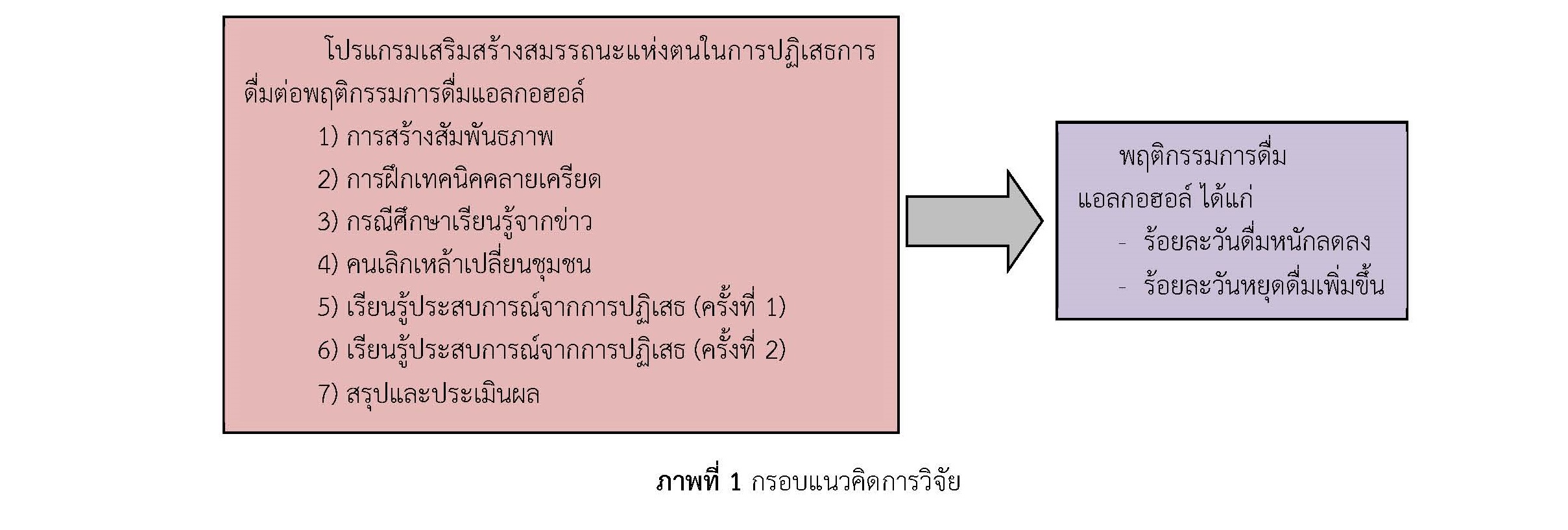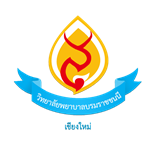Effect of the Self-efficacy Enhancement for Drinking Refusal Program on Alcohol Drinking Behaviors among Patients with Alcohol-Use Disorders, Suan Prung Psychiatric Hospital
Keywords:
Self- Efficacy Alcohol, Drinking Behaviors, Alcohol-use DisordersAbstract
The objective of this quasi-experimental study was to investigate the effect of the self-efficacy enhancement for drinking refusal program on alcohol drinking behaviors among patients with alcohol-use disorders. This study was conducted from October to December 2020. Participants were 30 inpatients diagnosed with alcohol dependence using the Diagnostic and Statistical Manual of Mental Disorders, Fifth Edition (DSM-5). All participants were randomly assigned to the experimental group or the control group, 15 inpatients in each group. The experimental group received the self-efficacy enhancement for drinking refusal program, 60-90 minutes each session for one week, while the control group received usual care. The research instruments included the Demographic Data Questionnaire, the Clinical Institute Withdrawal Assessment for Alcohol-Revised Version, the Montreal Cognitive Assessment, the Timeline Follow-back Calendar, and the Self-Efficacy Enhancement for Drinking Refusal Program. Data were analyzed using descriptive statistics, the Wilcoxon Sign-Rank test, and the Mann-Whitney U test. The results showed that: after completion of the program, the experimental group had a significantly lower mean percentage of heavy drinking days and a higher mean percentage of non-alcohol drinking (p-value<0.01). The mean percentage of heavy drinking days of the experimental group was significantly lower than the control group (p-value<0.01). The mean percentage of non-alcohol drinking days of the experimental group was significantly higher than the control group (p-value <0.01). Nurses can implement the Self-Efficacy Enhancement for Drinking Refusal Program to reduce alcohol drinking behaviors and readmission rates among patients with alcohol-use disorders.
References
ชณัณฎา เวชชะ, สุรชาติ สิทธิปกรณ์, และลัดดา แสนสีหา. (2559). ผลของโปรแกรมส่งเสริมสมรรถนะแห่งตนต่อการรับรู้สมรรถนะแห่งตนเพื่อปฏิเสธการดื่มสุราและภาวะติดสุราในผู้ชายที่มีภาวะติดสุรา. วิทยานิพนธ์พยาบาลศาสตรมหาบัณฑิต การพยาบาลผู้ใหญ่ บัณฑิตวิทยาลัย. มหาวิทยาลัยมหาสารคาม.
นวยนาฎ สมเพชร และจารุณี รัศมีสุวิวัฒน์. (2561). ผลของการบำบัดเพื่อเสริมสร้างแรงจูงใจต่อพฤติกรรมการดื่มสุราในผู้ติดสุราหญิง. เชียงใหม่: โรงพยาบาลสวนปรุง.
ปิ่นแก้ว ประทุมทา. (2551). ประสิทธิผลของการใช้โปรแกรมการเสริมสร้างสมรรถนะแห่งตนสำหรับการปฏิเสธการดื่มเครื่องดื่มแอลกอฮอล์ของผู้ที่มีการดื่มแบบอันตราย โรงพยาบาลส่งเสริมสุขภาพ ตำบลบ้านปงตำ จังหวัดเชียงใหม่. การค้นคว้าแบบอิสระปริญญาพยาบาลศาสตรมหาบัณฑิต สาขาวิชาสุขภาพจิตและการพยาบาลจิตเวช บัณฑิตวิทยาลัย. มหาวิทยาลัยเชียงใหม่.
พันธุ์นภา กิตติรัตนไพบูลย์ และ หทัยชนนี บุญเจริญ. (2549). การประเมินความเสี่ยงและ ความรุนแรงของภาวะถอนพิษสุรา ใน พันธุ์นภา กิตติรัตนไพบูลย์ และหทัย ชนนี บุญเจริญ. แนวเวชปฏิบัติการให้บริการผู้มีปัญหาสุขภาพจิตจากแอลกอฮอล์ในโรงพยาบาลจิตเวช. เชียงใหม่: ไอแอมออเกไนเซอร์แอนด์ แอ๊ดเวอร์ไทซิ่ง.
ภาสิต ศิริเทศ และณพวิทย์ ธรรมสีหา. (2562). ทฤษฎีการรับรู้ความสามารถของตนเองกับพฤติกรรมการดูแลสุขภาพของผู้สูงอายุ. วารสารพยาบาลทหารบก, 20(2), 58-65.
โรงพยาบาลสวนปรุง. (2563). ฐานข้อมูลผู้มีปัญหาจากการดื่มแอลกอฮอล์ที่เข้ารับบริการในปีงบประมาณ 2561-2563. เชียงใหม่: ระบบสารสนเทศเพื่อการจัดการและการบริหารโรงพยาบาลสวนปรุง.
แววดาว วงศ์สุรประกิต และพิมพาภรณ์ แก้วมา. (2561). การบำบัดการเสริมสร้างแรงจูงใจในการลดการดื่มต่อการรับรู้ความสามารถของตนเอง และพฤติกรรมการดื่มของผู้ที่เป็นโรคติดแอลกอฮอล์ชายโรงพยาบาลสวนปรุง. เชียงใหม่. โรงพยาบาลสวนปรุง.
ศรีไพร โปธา. (2550). ผลของโปรแกรมเสริมสร้างสมรรถนะแห่งตนในการปฏิเสธการดื่มต่อพฤติกรรมการดื่มแอลกอฮอล์ของผู้ที่เป็นโรคติดสุราในโรงพยาบาลบ้านธิ จังหวัดลำพูน. การค้นคว้าแบบอิสระปริญญาพยาบาลศาสตรมหาบัณฑิต สาขาวิชาสุขภาพจิตและการพยาบาลจิตเวช บัณฑิตวิทยาลัย.มหาวิทยาลัยเชียงใหม่.
สาวิตรี อัษณางค์กรชัย และสุวรรณา อรุณพงศ์ไพศาล. (2557). ปัญหาและความผิดปกติจากการดื่มสุรา: ความสำคัญและการดูแลรักษาในประเทศไทย. สงขลา: คณะแพทยศาสตร์มหาวิทยาลัยสงขลานครินทร์.
สาวิตรี อัษณางค์กรชัย. (2562). ข้อเท็จจริงและตัวเลขเครื่องดื่มแอลกอฮอล์ในประเทศไทย.กรุงเทพฯ: สหมิตรพัฒนาการพิมพ์.
สำนักงานสถิติแห่งชาติ. (2560). การสำรวจพฤติกรรมการสูบบุหรี่และการดื่มสุราของประชากร พ.ศ. 2560. กรุงเทพฯ: สำนักงานสถิติแห่งชาติ.สำนักนายกรัฐมนตรี.
สุนทรี ศรีโกไสย. (2557). แบบวัด time-line Follow -back: ฉบับภาษาไทย. เชียงใหม่.
สุพรรณ ไชยวรรณะ. (2551) ผลของโปรแกรมเสริมสร้างสมรรถนะแห่งตนในการปฏิเสธการดื่มต่อพฤติกรรมการดื่มแอลกอฮอล์ของผู้ที่ดื่มแบบมีปัญหา ที่มารับบริการในโรงพยาบาลแม่สรวย จังหวัดเชียงราย. การค้นคว้าแบบอิสระปริญญาพยาบาลศาสตรมหาบัณฑิต สาขาวิชาสุขภาพจิตและการพยาบาลจิตเวช บัณฑิตวิทยาลัย. มหาวิทยาลัยเชียงใหม่.
โสฬสินี เหมรุ่งโรจน์. (2556). แบบประเมินพุทธิปัญญา Montreal Cognitive Assessment (MoCA) ฉบับภาษาไทย. สืบค้นจาก http://www.mocatest.org/pdf_files/ instructions/MoCAInstructions-Thai.pdf.
อภิชาติ ดำรงไชย, กิตติพงษ์ สานิชวรรณกุล, สุรเชษฐ์ ผ่องธัญญา, และกนิษฐพจน์ เจริญภักดี. (2546) การพัฒนาแบบประเมินอาการถอนแอลกอฮอล์. ในการประชุมวาการนานาชาติ ครั้งที่ 2. สุขภาพจิตกับยาเสพติด. (น.80). กรุงเทพฯ.
อิสรีย์ สิงห์สถิตย์. (2555). ประสิทธิผลของการใช้โปรแกรมเสริมสร้างสมรรถนะแห่งตนในการปฏิเสธการดื่มของผู้ที่เป็นโรคติดสุราโรงพยาบาลสวนปรุง จังหวดเชียงใหม่.การค้นคว้าแบบอิสระปริญญาพยาบาลศาสตรมหาบัณฑิต สาขาวิชาสุขภาพจิตและการพยาบาลจิตเวช บัณฑิตวิทยาลัย.มหาวิทยาลัยเชียงใหม่.
American Psychiatric Association. (2013). Diagnostic and statistical manual of mental disorders (5th ed.). https://doi.org/10.1176/appi.books.9780890425596
Bandura. (1997). Self-efficacy. The Exercise of Control. New York: W.H.Freeman.
Nasreddine, Z. (2004). The Montreal Cognitive Assessment is a brief cognitive screening tool for Mild Cognitive Impairment Intened for Health Professionals only. Retrieved from http://www.mocatest.org
Nasreddine, Z. S., et al. (2005). The Montreal Cognitive Assessment, MoCA: A brief screening tool for mild cognitive impairment. Journal of the American Geriatrics Society, 53(4), 695–699.
Saunders, J. B. (2004). National alcohol policy in Australia. The first national conference: Alcohol consumption and related problem in Thailand, Bangkok.
Sobell, L. C. & Sobell, M. B. (2000). Alcohol Timeline Follow back (TFLB). In American Psychiatric Association (Ed.), Handbook of Psychiatric Measures (pp. 477-479). Washington, DC: American Psychiatric Association.

Downloads
Published
How to Cite
Issue
Section
License
1. บทความหรือข้อคิดเห็นใด ๆ ที่ปรากฏในวารสารวิจัยการพยาบาลและการสาธารณสุข ที่เป็นวรรณกรรมของผู้เขียน บรรณาธิการไม่จำเป็นต้องเห็นด้วย
2. บทความที่ได้รับการตีพิมพ์ถือเป็นลิขสิทธิ์ของ วารสารวิจัยการพยาบาลและการสาธารณสุข








